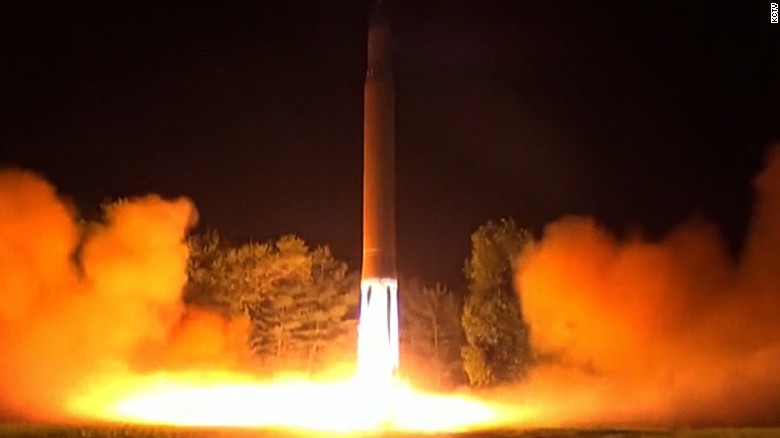Media Report

- CNN reports: "The US Treasury Department announced new sanctions Tuesday targeting Chinese and Russian entities that help fund and facilitate North Korea's nuclear and ballistic missile programs. Coupled with the United Nations Security Council resolution passed earlier this month, Tuesday's sanctions are intended to further isolate the companies and individuals outside of North Korea that are providing key support to Pyongyang's nuclear ambitions... Chinese and Russian entities -- including energy companies, coal and oil traders, labor exporters and facilitators of sanctions evasion -- were listed as the primary targets of Tuesday's sanctions... A Chinese government official said last month that China-North Korea trade was worth $2.6 billion in the first half of 2017, up about 10% over the same period last year."
- Vox reports: "President Donald Trump is pursuing an unconventional and controversial strategy for pressuring China to open up its doors wider to American business. It's a sign that the Trump administration is still willing to risk a trade war with China despite its ouster of strategist Steve Bannon, the most prominent economic nationalist in the administration. The move involves launching an investigation into whether China is violating international trade law by systematically stealing intellectual property... If the new investigation, which could take up to a year, results in economic punishments against China, it will cause uproar in the global trade arena... The Section 301 gambit is a risky one for two main reasons. First, the US effectively agreed to stop using it once the global community agreed to form the World Trade Organization in 1995. If the US does actually take actions against China under the provision, it would undermine the global trade system... Second, the new investigation isn't designed to protect American workers, like most of Trump's trade actions. Instead, its primary function is to make it easier for American corporations to expand their operations abroad — a process which often means they fire US workers and hire cheaper foreign ones."
- The Washington Post comments: "President Trump delivered a sharp warning to Pakistan on Monday, saying he intends to hold its leaders to account for harboring militant groups responsible for perpetuating instability across the border in Afghanistan... He declined, however, to similarly admonish three other regional powers whom the United States views as complicit in undermining progress there: Russia, Iran and to a lesser extent China... Trump has been candid in his criticism of China for not doing more to help counter the provocative actions being taken by North Korea, whose leaders have threatened a nuclear attack against the United States. But his administration has said little about Beijing's comparatively minor contributions in Afghanistan. China, as one observer notes, has 'chosen to assume a minimalistic role in the security sector, refusing to get involved in direct military operations' but benefiting nonetheless from the U.S. and NATO presence there. As Military Times' Shawn Snow reported in March, Beijing is seen as something of a 'freeloader' in Afghanistan... China was one of four countries, including Russia, Iran and Pakistan, that sent envoys to an Afghan summit in the spring — talks the United States refused to attend. But overall, its objectives appear less nefarious than the others."
Calendar
- 2017-08-21 Bannon exit provides only temporary relief to China
- 2017-08-20 China has more to lose in US trade showdown, says report
- 2017-08-18 China Steps Up Warnings Over Debt-Fueled Overseas Acquisitions
- 2017-08-17 Steve Bannon, Unrepentant
- 2017-08-16 U.S. and China Ink Military Agreements; Mattis And His Troop Talk
- 2017-08-15 Trump administration goes after China over intellectual property, advanced technology
- 2017-08-14 We're Holding Pyongyang to Account
- 2017-08-13 China a sweet spot for US companies' earnings in second quarter
- 2017-08-11 China warns North Korea: You’re on your own if you go after the United States
- 2017-08-10 When the U.S. Last Faced an Emerging Nuclear Threat in East Asia
News
- CNN US targets Chinese, Russian entities funding North Korea's nukes
- Vox Trump's new attack on the Chinese economy, explained
- CNBC Collision of USS John S. McCain is met with 'applause' in China, according to state media
- USA Today Cambridge University Press reverses bow to China censorship after backlash
- The New York Times Activist Confesses to Subversion in Chinese Show Trial
- Financial Times Cambridge University Press makes U-turn on China censorship
- Reuters China defends ally Pakistan after Trump criticism
- CNBC Global funds expanding into massive Chinese investment market
- The New York Times China, Like U.S., Struggles to Revive Industrial Heartland
- Reuters China warns U.S. ahead of Taiwan defense minister's brief visit
- CNBC Google has no cloud business in China, which will make it hard to catch up with Amazon
- Barron's Why This Billionaire Dumped China; Stock Surges 9%
- BuzzFeed China Boosting Phishing Attacks -- Against Vietnam
- CNBC One of China's hottest stocks is a tiny glass company you've never heard of
- The Verge NFL partners with Tencent to stream live games in China
- Reuters Ford, China's Zotye Auto plan JV to build electric vehicles
Commentary
- The Washington Post Three countries undermining Afghanistan progress that President Trump didn't call out
- The Hill Finally, US appears ready to battle China's rampant IP theft
- Economist Why China is sick of foreign garbage
- Council on Foreign Relations Asia is Adding to its FX Reserves in 2017 (China Included?)
- The Hill China's new investment rules may cheapen your rent
- Financial Times China's cat-and-mouse game over capital outflows set to continue
- Forbes British Publisher Refuses China's Censorship Demands, But Academia Still Likely To Suffer